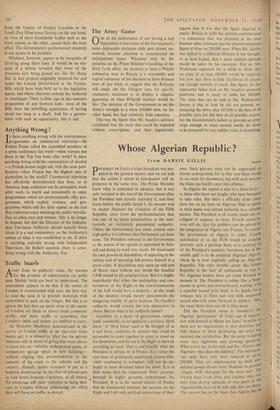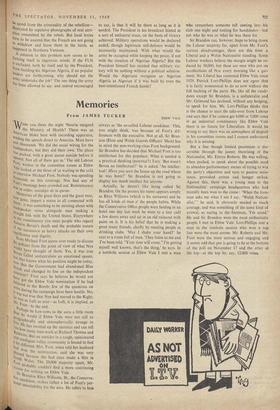Whose Algerian Republic?
From DARSIE GILLIE
PARIS
pRESIDENT DE GAULLE'S last broadcast was pre- pared in the greatest secrecy and we are told that the action it seems to foreshadow will be prepared in the same way. The Prime Minister knew what it contained in advande, but it was only revealed to the rest of the Government after the President had already recorded it, and four hours before the public heard it. Its manner and its matter illustrate the evolution of the Fifth Republic away from the parliamentarism that was one of its latent potentialities at the start, towards an exclusively presidential authority. Unless the Government has some control over high policy it is obvious that Parliament can have none. The President referred to the Government in the course of his speech as appointed by him- self and doing its work very nicely. He mentioned his own powers of dissolution, of appealing to the nation, and of assuming full powers himself in a grave crisis. A dissolution may seem an odd sort of threat since without any doubt the Gaullist UNR would be the principal loser. But it is highly improbable that either the nationalists and con- servatives of the Right or the non-Communists of the Left would have a majority : so the result of the election would merely demonstrate the dangerous futility of party factions. De Gaulle's authority would remain the sole alternative to chaos. But on what is his authority based?
Gaullism, as a tactic of government, reveals itself, essentially, as an appeal to a political 'third force.' A 'third force' used to be thought of as a real force, countries or citizens who could be persuaded to come together in order to stand up for themselves, and hit out to the Right or the Left according to need.. That is not exactly what the President is relying on in France. It is rather the vast mass of professedly unpolitical citizens who, while continuing to complain. will not be un- happy to have decisions taken for them. it is in their name that the impersonal 'State' governs, through its highly personal embodiment, the President. It is in the sacred interest of France that he manoeuvres between the persons on the Right and Left with political convictions of their own. Such persons must not be suppressed of driven underground, for in that case there would be no room for manoeuvre, but with such persons the State can hardly enter into alliance.
In Algeria the appeal is also to a third force— to those who have not fought, who have hesitated to take sides. But there a difficulty arises since there has so far been no Algerian State to speak in their name and entrust authority to a suitable person. The President is of course much too in- telligent to suppose, as many French 'conserva- tives still do, that the problem can be solved by the integration of Algeria into France. To entrust the government of Algeria to either French nationalists or to the FLN would be creating precisely such a partisan State as is contrary to all the President's instincts. Somehow out of the middle gulf is to be conjured Algerian Algeria. which he is now explicitly calling an Algerian Republic, The only trouble about this future Republic is the lack of enthusiasts to run ir. No Algerian leaders have yet come forward to sponsor it. The President is rather like a head- master in gown and mortar-board, waiting. wth a superbly bound prize book in his hands, for a virtuous boy in Eton suit and with unspotted record who will come forward to claim it. Alas, the most likely boys are all in blue jeans. Did the President mean to manoeuvre the Algerian 'government' of Tunis out of negoila" tion with himself at Melun last June? In so far 35 there are no negotiations in that direction and little chance of them developing, the army has received one satisfaction. But the army is asking some very legitimate and pressing questions. What is it to say to the rank and file—French and Algerian—that does the fighting? The metropoli- tan units have now been reduced to about. 250,000. They are supplemented by local self- defence groups drawn from Moslems in pacified villages, with shot-guns for the most part. The French boys from town and country who vs], their lives during upwards of two years in the Algerian hills have to be told why they are there• has t° The answer has so far been that Algeria he saved from the criminality of the rebellion— illustrated by repulsive 'photographs of real atro- cities committed by the rebels. But local levies have to be assured that the French are not going to withdraw and leave them in the lurch, as happened in Northern Vietnam.
A solution to this problem now seems to be forming itself in ingenious minds. If the FLN is excluded, both by itself and by the President, from building his Algerian Algeria, if no popular leaders are forthcoming, why should not the army undertake the job? The one thing the army has been allowed to say, and indeed encouraged to say, is that it will be there as long as it is needed. The President in his broadcast hinted at a sort of unilateral truce, on the basis of victory achieved. Military operations would be declared ended, though legitimate self-defence would be necessarily maintained. With what would the army be occupied while keeping the peace, if not with the creation of Algerian Algeria? But the President himself has insisted that military vic- tory will be nothing without a political solution. Would the Algerians recognise an Algerian Algeria as Algerian if it was built by even the best-intentioned French hands?















































 Previous page
Previous page